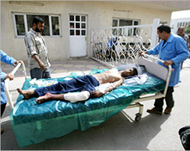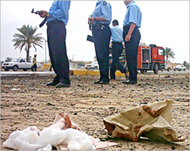Several killed in Iraq blast
A bomber has killed at least five people at an Iraqi customs post and authorities have discovered 12 more bodies of people shot execution-style in escalating violence.

Iraqi politicians meanwhile pressed ahead with efforts on Monday to reach out to Sunni Arabs, who were dominant under Saddam Hussein, hoping to lessen their support for the anti-government campaign which has killed over 400 people since a new government was announced late last month.
Prime Minister Ibrahim al-Jaafari said Iraq’s top Shia cleric Ayatollah Ali al-Sistani told him in a meeting in the sacred city of Najaf that Sunni Arabs should have a bigger role in the government and drafting the constitution.
The Shias and Kurds who dominate Iraq’s parliament are trying to give Sunni Arabs a greater role in politics.
Al-Jaafari also said the government would crush efforts to inflame sectarian tensions.
 |
|
The Iraqi prime minister promised |
“The government will hit with an iron fist anyone who harms the Sunnis or the Shias or any of the Iraqi people,” he said.
Deadly attack
In the day’s deadliest attack, a bomber drove towards US troops near the customs post in the town of Rabia near the Syrian border and blew himself up, killing at least five people and wounding 30, according to Nassar al-Rakaad, chief administrator of the town in northwest Iraq.
Violence also hit Baghdad. A blast targeting a Western security convoy killed two Iraqis, police said, and a mortar hit Mustansiriya University, killing two people.
Two car bombs exploded in Baghdad’s Doura district, killing two people and wounding 12, hospital officials said.
And in the latest gruesome discovery, police found 12 bodies of Iraqi men dumped on Baghdad’s outskirts, raising to 46 the number of corpses found dumped around Iraq since Saturday.
Escalating violence
Iraq’s new leaders have promised stability but anti-government fighters have gained fresh momentum, raising fears that the bloodshed will spill over into a full-blown sectarian and ethnic conflict.
Iraqi security forces have struggled in their new role.
And after years under Saddam, Iraqis are now resentful of what they say are aggressive soldiers.
 |
|
Civilians are often the victims of |
Seeking to ease tensions, Iraqi Defence Minister Saadoun al-Dulaimi said on Monday that troops would be barred from raiding mosques in response to complaints about their conduct.
“We received many complaints over the last days. We shouldn’t be a source of fear among Iraqis,” he told a news conference.
“We hear soldiers are raiding mosques and places of worship and terrifying civilians, children and worshippers.”
Aside from trying to build confidence in the security forces, Iraqi leaders are also struggling to balance the interests of sectarian and ethnic factions who have been at odds since 30 January polls dramatically changed the power structure.
But despite efforts by the Shias and Kurds to win over more Sunni Arabs, many remain angry.
Sunni accusation
The influential Sunni Muslim Clerics Association accused the government on Monday of state terrorism.
“There is an unjustified silence that may be interpreted as acceptance of security violations that are undertaken by Iraqi soldiers and militias that cooperate with them,” Muthanna al-Dari, the group’s spokesman, told a news conference.
 |
|
Iraqi security forces are being |
“We are facing state terrorism and the terrorism of security organisations using their official name as a cover to achieve their targets. Over the last two days soldiers have carried out a campaign of invasions (of mosques) and arrests.”
Iraqi officials accuse the al-Qaida leader in Iraq, Abu Musab al-Zarqawi, of ordering bombings against Shias in a bid to spark a full-scale sectarian conflict.
Most Shias have heeded calls by religious leaders to show restraint. But the violence has raised questions over how long moderation can last.
Iraqi leaders appointed Saadoun al-Dulaimi, a Sunni, as defence minister, and he has been frank in his assessment of Iraq’s complex security crisis.
Violent crossroads
Al-Dulaimi said the people who were shot and dumped in Baghdad were killed by men wearing uniforms worn by police and army special forces.
“Iraq has become a crossroads for international terrorism and there are many parties who want to weaken this government,” he told a news conference.
“Therefore there are some who wear uniforms that resemble those of the Iraqi army or the Ministry of Interior and commit terrorist acts and kill people.”
In other violence on Monday, anti-US fighters fired mortars at an Iraqi army base in the town of Khan Bani Saad northeast of Baghdad, killing four soldiers, the Iraqi military said.
The government said it had arrested in Mosul a fighter, Salim Yussef Ghafif Hussein, responsible for preparing bombs and who is affiliated with al-Qaida’s network in Iraq.